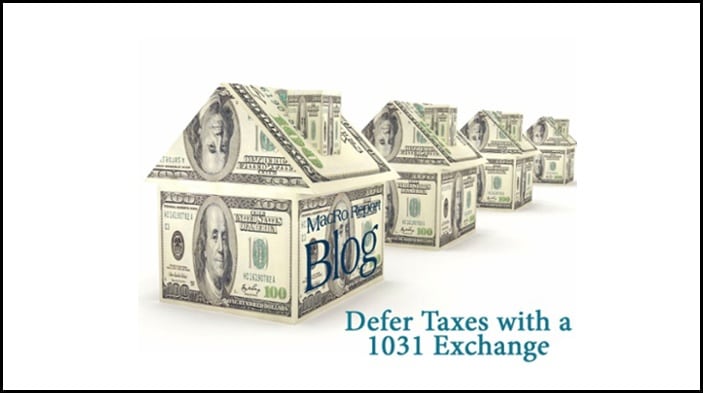MacRo is pleased to feature an article written by Anca Stradley of MKS&H CPAs and Business Consultants.
 The following article was originally posted as a MKS&H Insight Tax Article. The complete text of the article is posted with permission from MKS&H.
The following article was originally posted as a MKS&H Insight Tax Article. The complete text of the article is posted with permission from MKS&H.
Whenever you sell a business or an investment property and you have a gain, you generally have to pay tax on the gain at the time of sale. IRC Section 1031 provides an exception to this and allows you to postpone paying tax on the gain if you organize your transaction as part of a qualifying “1031 exchange”.
So what exactly is a 1031 exchange? Broadly stated, a 1031 exchange is a “swap” of a business or investment property for another similar or “like-kind” property of the same nature, character or class. Generally, any individual or business entity may set up an exchange under Section 1031.
To understand how a this exchange works, consider the following example:
- An investor sells an asset that has appreciated in value for $250,000, resulting in a $200,000 capital gain and a tax liability of approximately $70,000 in combined taxes (depreciation recapture, federal and state capital gain taxes) when the property is sold. Only $180,000 remains to reinvest in another asset.
- If the same investor chose to exchange his asset in a 1031 exchange, he or she would be able to reinvest the entire $250,000 in the purchase of another property and defer the $70,000 in taxes until the sale of the replacement property. Gain is deferred but not forgiven, however in theory the investor could avoid paying capital gains taxes forever. If the investor keeps rolling over the gain from one piece of real estate investment, for example, to another and another, or the investor keeps the replacement property his entire life, he will not have to pay the capital gains tax and, upon his death, the beneficiaries may be able to sell the property, capital gains tax free.
In order to obtain a complete deferral of the income taxes, all of the proceeds made from the sale of the previous property must be immediately re-invested in the new property, which must cost the same or more than the former property. Sometimes this can happen simultaneously, but most of the time there is a delayed exchange. Partial deferral, with some gain recognition is also possible if only a part of the proceeds are reinvested.
Even though it is a simple concept, a 1031 exchange is surrounded by a lot of special rules and not so simple details. There are specific rules in regards to the time limits that must be met in regards to identifying and closing on the replacement property. Also, there are rules in regards to who takes control of the cash or other proceeds before the exchange is completed and also it is critical to adjust and track basis in the two properties correctly to comply with the regulations. And there are plenty of reporting requirements to be followed. Due to all of the complexities surrounding a 1031 exchange, it is important to ask the advice of a professional if you are interesting in pursuing one.
Article contributed by Anca Stradley, MKS&H Tax Accountant
About MKS&H: McLean, Koehler, Sparks & Hammond (MKS&H) is a professional service firm with offices in Hunt Valley and Frederick. MKS&H helps owners and organizational leaders become more successful by putting complex financial data into truly meaningful context. But deeper than dollars and data, our focus is on developing an understanding of you, your culture and your business goals. This approach enables our clients to achieve their greatest potential.
For more news and insites from the MacRo Commercial Real Estate Team and guests, such as Anca Stradley, be sure to sign up for updates from the MacRo Report Blog by clicking the button below.

